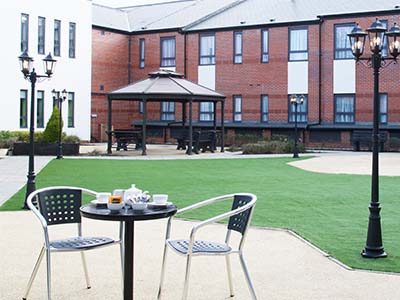What Types of Care Are Available in a Care Home?

There are multiple care types to take into consideration when looking into moving into a care home, so it is important to understand the differences between them to work out which option would be best for you or your loved one.
There is a wide range of care types available to you and many different facilities that offer some or all of these care types, meaning that it’s important to ensure you understand the difference and find the correct one if it has come to the time for you to consider care for yourself or a loved one.
Some care homes exclusively offer one type of care for example a Residential Home, whereas some others may offer multiple tailored care services. It is important to distinguish the difference between these and what each type of care home entails.
1. Residential Care Homes
Residential Care homes are one of the most common types of care homes. It is also sometimes referred to by other names including ‘assisted living’, ‘group living’ or ‘personal care’. The name of the home itself is described by the type of care and support that is offered to residents, where they receive accommodation and personal care aid with some of their important daily tasks including mobility, housekeeping and cleaning. It allows residents to live independently whilst doing what they enjoy, whilst receiving the support they deserve when it is needed.
What do Residential Care Homes Offer?
- Support with daily tasks whilst living independently
- The choice to spend your days how you wish including routine, food, activities and more
- Staff available 24 hours a day, 365 days a year
- A healthy and active lifestyle with variety, based on personal preference
- Group living with like-minded individuals as well as being provided with opportunities to purse new interests and meet new people

2. Nursing Care Homes
Nursing care is tailored to those that have specific health needs whether that is due to a mental health condition, an injury, physical limitations or long-term health problems. This differs from Residential Care as Nursing Care includes all the advantages that a residential care home offers, whilst also making sure personal, medical and health care is properly catered for.
Within a nursing home, there will be qualified care individuals that can provide the medical attention needed for nursing care residents and who will also contribute to and update each resident’s care plan whilst keeping in contact with other nurses and loved ones about the individuals' health care.
What do Nursing Homes Offer?
- Personal and medical support by experienced and qualified nurses
- Suitable care options for those who suffer from physical limitations, a long-term health problem, an injury or a mental health condition
- Support for residents by collaborating with GPs, pharmacists and specialist medical teams
- Equipment for the needs of nursing residents including hoists, walk-in showers, specialist beds and a nurse calling system
3. Care Homes Offering Dementia Care
A care home that offers care for people with dementia includes living with like-minded people, whilst receiving assistance for certain daily tasks such as clothing, washing, mobility and more. There are two different types of dementia care which are residential dementia care and specialist dementia care.
Residential dementia care refers to those who require low-level assistance but would benefit from having around-the-clock access to that extra level of support. Specialist dementia care is for individuals with more advanced needs due to their stage and symptoms of dementia.
A dementia care home has a team that is specially trained for the needs and requirements of these residents to ensure they are catered for in the most appropriate way and to the highest degree. The environment of the home will be purposely built for residents, making them feel comfortable and safe by means such as hallways with lots of space, large clocks, large signs and contrasting colours which are easier to read.
What do Care Homes with Dementia Care Offer?
- An environment where residents feel safe and secure at all times
- 24/7 companionship from like-minded individuals, specialist staff and loved ones
- Dementia-friendly facilities and activities
- Familiar surroundings at all times making it their home-away-from-home
- Ongoing training to ensure staff are up to date with the latest industry methods, ensuring residents are recieving the most effective form of care
- An opportunity to stay independent, keep a routine and maintain dignity
- Assistance where needed with important tasks where needed including mobility, washing, clothing, communication and more

4. Dual Registered Care Homes
Dual-registered care homes are those that have more than one care type to offer, in one place. It includes numerous types of care in order to fulfil a whole range of needs, for example, some homes offer both residential and dementia care to encompass those that would fall under these categories.
Residential and nursing care together is also common which means more often than not, a continuum of care is offered and residents don’t have to move homes if their care need progress.
Dual-registered care homes are a brilliant example of how care plans are reviewed regularly and can be developed based on if people's care needs change when they are residing in the care home. It also means that if an individual is comfortable and enjoying where they are living, they won’t have to move home if their care needs to develop or change.



Our Care at Amberley Care Home
At Amberley Care Home, our professional and dedicated team provide unrivalled levels of Nursing Care, Residential Care, Residential Dementia Care and Respite Care in the beautiful town of Sale, Greater Manchester.
We take on a person-centred approach to our specialist care; our residents and their loved ones can be assured that our team is committed to providing assistance and support every step of the way. Each resident will have a care plan tailored to them, which is reviewed on a regular basis and adapted accordingly.
Care Types and Services Offered at Amberley Care Home
- Residential Care
- Residential Dementia Care
- Nursing Care
- Respite Care
- Palliative Care / End of Life Care
- Access to a GP, Dentist, Opticians, Chiropodist and Physiotherapist
Who is Our Home Suitable For?
- Dementia
- Old Age
- Physical Disability
- Sensory Impairment
- Younger Adults
What is the Difference Between a Care Home and Live-in Care?
There is a key difference between care homes and live-in care. Live-in care is where you stay residing in the comfort of your home or facility, and you are visited by nurses or carers on a regular basis. Alternatively, a care home provides you with accommodation, meals, activities and 24/7 care alongside others who also require this type of assistance.
Amberley Care Home is an all-inclusive care home offering multiple types of care 24 hours a day. We have a team made up of numerous highly-skilled and qualified care assistants who strive to ensure residents receive the care, love and attention they deserve. We take pride in the care we offer to residents as our customised care plans ensure we are always giving our residents the best care possible and forming bonds with them.

Speak to a Member of Our Team
Whether you are on the search for temporary short-term respite care whilst you are recovering from a hospital stay or require long-term care for a more specific need, Amberley Care Home is ready to welcome you with open arms and make our beautiful facility your home away from home. Our first-class care options and range of facilities together ensure residents live a rich and meaningful life during their time with us.
If you have any questions regarding our care home, care services or services please don’t hesitate to get in touch via email at info@amberleycarehome.com or call us on 01618 258222. Alternatively, you can complete our online Enquiry Form and one of our friendly team members will be in touch as soon as possible.





